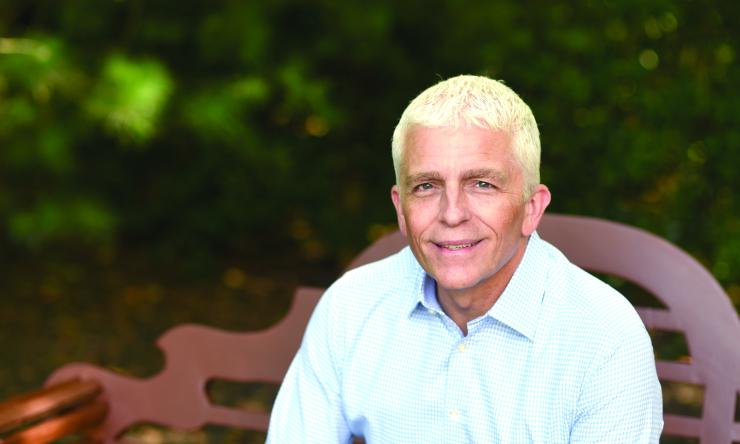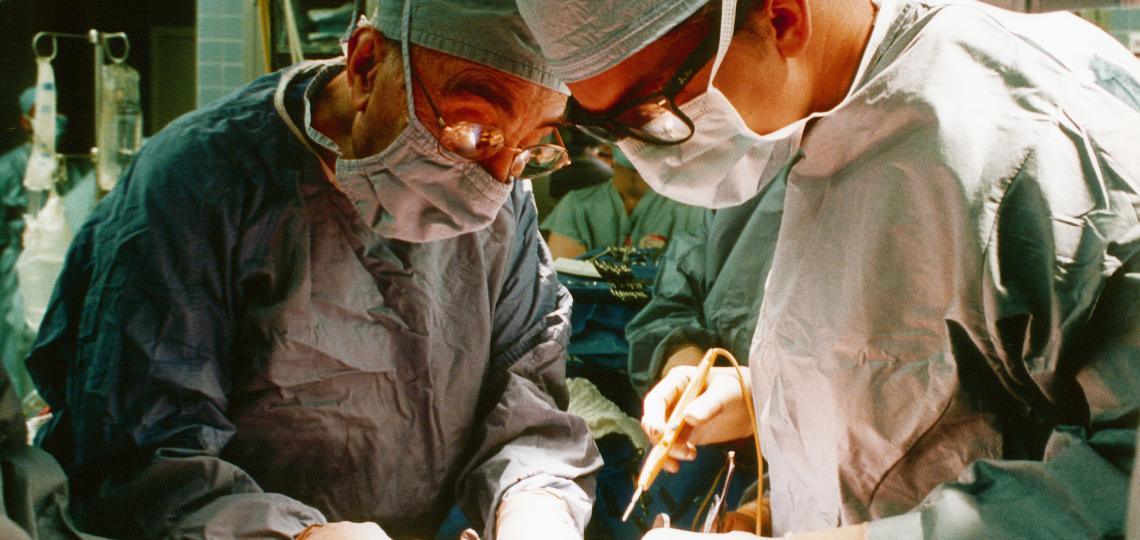Dr. John P. Williams Class of 1997

DeBakey Surgeon Update
As a breast cancer surgeon in Virginia, Dr. John P. Williams dedicates his professional career to advancing quality cancer care in his community. On a national level, he advises the President of the United States regarding the National Cancer Program serving as chairman of the President’s Cancer Panel. He credits Dr. Michael E. DeBakey and his many associates in the Department of Surgery for their guidance in finding a larger personal mission beyond excellent clinical care of patients.
Dr. Williams, a 1997 graduate from Baylor College of Medicine’s General Surgery Residency Program, is deeply passionate about patient care, he is equally committed to advocating for patient education and advancing cancer policies in the United States.
When Dr. Williams began his education at Duke University as a freshman, he knew his goal was to become a doctor. He was fascinated by the complexity of the brain and eventually began performing neurology research at Duke University School of Medicine.
“I still wanted to be a neurologist until I realized that surgery fascinated me more than the brain,” Williams said. “My need to diagnose a problem and be capable of fixing it was insatiable. I interviewed all over the country for a surgical residency position and my travels ultimately led me to Houston and Baylor College of Medicine.”
Medicine runs in the Williams family. Dr. Williams and his father, Dr. L. Polk Williams Jr., both trained to become surgeons under the guidance of the legendary Dr. Michael E. DeBakey at Baylor College of Medicine. Williams’ grandfather was also a family physician in the small town of Edenton, North Carolina, in the early 1920s.
“Dr. DeBakey’s life motto was ‘The pursuit of excellence has been my objective in life,’ and you can’t be associated with him without learning that principle and striving for excellence in what you do,” Williams said. “Dr. DeBakey demanded the very best of you. It was unacceptable for you not to give your best, and I saw this level of commitment at Baylor and in all the professors there.”
Dr. Williams initially practiced general surgery, but ultimately specialized in breast surgery during a 15-year period. “I appreciated surgery, and specifically breast cancer surgery, because it represented an opportunity for me help those in need, facing the complexities of a diagnosis of cancer. Being a surgeon, the relationships that you make with people in crisis, and becoming connected with them as a confidant for years—all of these things drew me into breast cancer surgery.”
Advocacy and Patient Education
While Dr. Williams’ clinical practice in Northern Virginia has helped countless breast disease patients, he wanted to do more to advance cancer education and policy on a larger scale. In 2008, he founded the Novant – UVA Multidisciplinary Breast Cancer Conference in Haymarket, Va., to enhance the team approach of breast specialists working together to treat this disease. In 2009, The UVA Community Health Breast Center developed from this broad collaboration and Dr. Williams’ leadership. He served as medical director for the center from 2009 to 2018 and resumed leadership in 2021.
“In forming the UVA Multidisciplinary Breast Cancer Conference, I created a multidisciplinary team and within a year obtained accreditation from the National Accreditation Program for Breast Centers. As a group we had perspectives from different medical specialties and surgeons that allowed us to treat our patients, and it has helped women get better cancer care. But eventually I realized the medical community wasn’t actually teaching breast cancer patients what they need to know to be able to ask the right questions and get the best care. That’s why I created the Breast Cancer School for Patients in 2018.”
The project was the very first video-based educational website for breast cancer patients, and a leap forward in communicating the complex concepts of breast cancer care to newly diagnosed women. The premise behind the website is that patients will make better treatment decisions when they are taught to be “experts” in their own breast cancer care. Historically, medicine hasn’t taught people what they need to know about a condition; instead, it has focused on providing information and caring for patients. Dr. Williams shared, “I am so proud that if you go to YouTube.com and search the term “breast cancer” you will see my educational videos listed at the top and are the most watched in the world.”
“When people are facing medical conditions the first thing they do now is get online and do their own research,” Williams said. “While people are very comfortable spending hours interacting with technology for medical information, no one is going to spend that same energy reading a book on the same topics. Medicine is woefully behind in putting information online and in formats people will interact with. It’s a failing of the larger health system, and I think the success of the Breast Cancer School for Patients is an example of a solution. My goal is to help medicine catch up.”
Advisor to Presidents
Just one year after launching the online educational resource, Dr. Williams received a presidential appointment to be chairman of the President’s Cancer Panel at the National Institute of Health. The panel is designated to serve as advisors to the President of the United States on the National Cancer Program. Each year the three-person panel issues an annual report with policy recommendations about an important topic in cancer. The most recent President’s Cancer Panel report on “Closing Gaps in Cancer Screening” was issued in February as part of the President’s Cancer Moonshot.
“As a private-practice surgeon that sees patients every day, my input reflects a connection to the people we are trying to help—not just a perspective on policy,” Williams said. “My role as chair of the panel is an opportunity of a lifetime and a way to help others and shape policy in a kind, effective way.”
During the next decade, Dr. Williams hopes his efforts will impact the way medical institutions and professionals educate the public. “If I were to influence anything, it would be the opportunity medicine has to reach more people through apps and free platforms that we don’t already use. I hope to bring a human touch to policy that helps heal cancer patients. If I can do that, I will have succeeded in my life’s mission and hopefully have made Dr. DeBakey and his colleagues at Baylor College of Medicine proud.










 Credit
Credit
